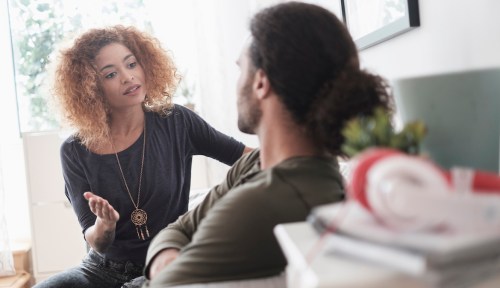How to Talk to a Defensive Person (and Keep Your Cool), According to Experts
Dealing with defensive people? Communication experts explain how to talk to someone who gets defensive and protect your feelings.

If you have a friend or partner who you’ve known long enough, you can probably read them like a book, and even anticipate how they’re going to react when a tricky conversation comes up. When it comes to arguments, this can be useful, especially if the other person tends to get defensive during conversations. You can likely predict that the possibility of a productive conversation will go out the window as soon as their walls of defensiveness come up. So, how do you talk to someone who is defensive?
Experts in This Article
therapist at the telehealth and in-clinic mental health provider Octave.
sex educator
“Defensiveness can come up for a myriad of reasons. We may have the urge to protect ourselves, get defensive based on how someone is responding or reacting to us or can get defensive based on our own insecurities,” explains Channing Richmond, LMFT, therapist at the telehealth and in-clinic mental health provider Octave. Sometimes you might have to deal with defensive parents who don’t admit to meddling in your personal life, stave off a fight with a friend about not making enough time for each other, or have a discussion about your significant other not doing their share of the housework. Either way, the potential for words to be misconstrued and emotions to collide becomes palpable. This is especially true in newer friendships or romantic relationships where you may not have developed that sixth sense and may need a bit more intel when it comes to figuring out why someone is acting defensive of their behavior.
It can be tricky to navigate these dialogues with defensive people but there are ways to respond to defensiveness that lay the groundwork for a calm and productive conversation. Ahead, relationship experts explain how to talk to someone who is defensive, how to make sure you’re both heard and understood, and how to break defensive behavior if you’re someone who is always on guard.
Why do people get defensive?
It’s true that everyone has different communication styles in relationships, which can make it especially difficult for some to learn how to talk to someone who is defensive. In general, for communication to be effective, a few key elements should be present in the conversation: transparency, vulnerability, empathy, understanding, trust, and compassionate curiosity, which involves asking questions without weaponizing shame or anger to better understand where someone else is coming from, says Jillian Amodio, LMSW, a telehealth therapy provider at Waypoint Wellness Center in Maryland.
Defensive communication methods are a barrier to effective communication—they’re often a way someone tries to protect themself or avoid negative emotions, including fear, shame, embarrassment, or pain, according to Amodio. No one wants to feel any of those, understandably, so people may resort to placing the blame on someone else instead of owning up to their behavior, avoiding the topic at hand changing the subject, or denying wrongdoing outright.
“Defensiveness can be used to try to stop something that happened in the past from happening in the present.” —Channing Richmond, LMFT
Defensiveness is often normal and natural: At the root of it might be a desire to feel “safe” in a conversation, says Richmond. This type of behavior can depend on how someone feels about themself. For instance, if you see yourself in a positive light, overall, and don’t want others to see you negatively in some way, you might have that tendency to protect yourself and defend your words or actions. Self-judgment, insecurities, and lack of self-esteem can also warrant defensiveness if you hear that same harsh judgment from other people, according to Richmond.
Additionally, it’s not uncommon to see defensive behavior in people who have grown up with trauma or difficult family dynamics. “Defensiveness can be used to try to stop something that happened in the past from happening in the present,” Richmond says.
What are the signs of a person’s defensive behavior?
Defensive behavior is antithetical to openness and curiosity, according to research published by Cambridge University Press1. One tell-tale sign of defensiveness might be overly exaggerating the harm caused by someone else to deflect blame away from oneself, the research states. Other signs of defensive behavior include:
Verbal cues
You may notice some verbal signs of defensiveness, such as a change in tone or volume of voice, says Richmond. It’s also common that the person uses more sarcasm, or distorts facts so that they seem like more of the victim in the situation, adds Amodio. The person being defensive might stop listening to you or shut down completely, too.
Physical cues
Depending on how well you know the person, you might recognize changes in their body language immediately. Some physical signs of defensiveness can be stiffness or lack of relaxation, someone turning their body away from you, or walking away from the conversation. Those are just a few of the physical cues that scream defensiveness, says Richmond.
It’s making you feel anxious or uneasy.
Tap into your own emotions and gut reactions when trying to spot defensiveness in other people. When encountering someone who you think might be acting defensive, do a quick check-in with yourself and note your initial response. Is there a pit in your stomach or is their lack of accountability triggering a feeling of anxiety? You may even feel misunderstood when trying to have this difficult conversation, Richmond says, so it’s key to pay attention to what your body is telling you.

5 ways to start a conversation with a person who tends to be defensive
Prep for the conversation with mindfulness by ‘coping ahead.’
It’s important to be mindful when learning how to talk to someone who is defensive. Before you approach someone who you have a feeling might react defensively, keep in mind that there’s likely a reason behind their behavior, says Richmond. That said, you still might feel frustrated about an impending argument, so it’s also important to use a skill called “coping ahead,” says Richmond: Make sure you’re in the right headspace to have the conversation (use meditation or other grounding skills to ensure your mindset is calm before approaching the person).
Ask if the other person is ready to speak.
When learning how to talk to someone who is defensive, another way to ground yourself and the other person is to give them a heads-up that you’d like to speak about something. Giving them a warning to make sure it’s a good time to chat and they are ready to speak to you can be helpful in that. You can be clear and upfront about what you plan to discuss, and ask if they’re willing to participate in the conversation in a calm and rational manner, Richmond suggests.
Establish some goals for the conversation.
Are you able to agree on a plan of what you want to accomplish with this conversation and to manage any defensiveness that comes up? Richmond recommends that couples who are learning how to talk to someone who is defensive plan ahead to take a “time out” if the argument gets too heated or both partners can’t seem to stop resorting to defensive behavior. She also suggests agreeing on a code word to de-escalate the conversation and return to it at another time.
Plan to discuss the main issue at hand presently.
One of the worst things to do in an argument is to let it snowball with a statement like, “You never listen to me when I speak.” Those absolute “always” and “never” statements can provoke or exacerbate defensive behaviors on the other person’s part. When learning how to talk to someone who is defensive, try sticking to one topic at a time, and use “I” statements, Richmond suggests. That would look something like, “I feel when I was telling you about my doctor’s appointment, I didn’t feel heard.” That can be more productive in addressing one particular behavior or occurrence at a time so that the person doesn’t treat it as an attack on their character and goes on the defense.
Respect each other’s emotions, even if you don’t agree.
Projecting your own feelings on others won’t help you understand each other. You may not agree that you caused harm to the person or that someone “should” feel a certain way, but it’s important to seek mutual understanding, using as much curiosity and questioning as necessary to make the other person feel heard. Engage in “assertive communication,” says Amodio. “Assertive means that I respect myself and the other party equally and want both of us to feel heard, understood, and valued.”

How to stop someone from getting defensive
Name the defensiveness.
Sometimes, people might genuinely not be aware of their defensive behavior. It can be easier said than done, but in the heat of an argument, naming the defensiveness is important, says Richmond. You can gently tell someone, with an “I” statement: “I feel like you’re being defensive when I told you how I felt.” Otherwise, the defensiveness can snowball and get worse.
Approach defensiveness with curiosity.
In the middle of a conversation, it can be more productive to ask questions when someone starts to get defensive, advises Richmond. Why is that defensiveness happening? You might be able to diffuse some of the defensive energy by asking the other person what they’re feeling in the moment or what is coming up for them that’s making them feel the need to defend themself. That can help steer the conversation back toward effective communication, says Richmond.
Call someone “in” on their behavior.
There is a difference between calling someone out on behavior and calling them in. It has to do with acknowledging someone’s whole personhood, says Richmond. That means not using those absolute statements like “You just always shut down when we have an argument.” Calling someone in invites them to explain themselves and take accountability for their behavior, including their defensiveness; it gives them more of an opportunity to work on their defensiveness rather than building up more defensiveness.
Take a break if you need to.
Sometimes you need to know when to walk away from an argument. If you’re learning how to talk to someone who is defensive, it may require a breather or setting a boundary to not return to the discussion until the defensiveness is “unblocked” and both people have a moment to meditate on their words, actions, and intentions, says Richmond. You can make a shared decision about when to come back to the conversation.
How can being defensive hurt your relationship?
Studies, such as one published in the British Journal of Social Psychology 2in 2020, have shown that defensive behavior can damage relationships because it is not congruent with emotional integrity and with acknowledging the harm someone may have caused. “Defensive communication harms relationships because it acts as a barrier to resolving conflict, and serves to exacerbate the issues rather than address them,” Amodio says. It’s not always someone’s fault that the conversation is strained—experiences from childhood or past relationships such as trauma, abuse, or trust issues can play a role in provoking defensiveness because the person might be accustomed to feeling a lack of safety in certain scenarios, adds Amodio.
“Defensive communication harms relationships because it acts as a barrier to resolving conflict, and serves to exacerbate the issues rather than address them.” —Jillian Amodio, LMSW
Richmond acknowledges that defensive behavior can be harmful to couples working through their issues. Often, the smaller arguments are representative of a larger issue in the relationship. For example, if one partner is sharing that they wish their partner would have remembered to take out the trash, it can provoke defensiveness about the bigger problem: one person not taking on enough household tasks or a lack of equality in the relationship.
How do you break defensive behavior?
Even more difficult than learning how to talk to someone who is defensive is learning how to break that behavior if you are the person who tends to get defensive. Breaking defensive behavior requires you to be self-aware and open to feedback from other people in your life. Ahead, experts share a few useful tips to shut down defensive behavior.
Start with self-reflection.
If you’re a person who tends to exhibit defensive behavior when communicating, the first step is some self-reflection. “Be mindful of the interactions that you’re having with others—are they not ending as effectively as you need them to, or are folks taking more space from you?” Richmond inquires. This is a good opportunity to tap into social cues and do an inventory on the conversations you’ve been having and the results, she adds.
Check the facts of the situation.
Walk back through your most recent argument with your significant other or parents. You can reflect on whether or not you’ve jumped to conclusions or were only able to see your side of the story or situation, Amodio suggests. Then, “Ask yourself what your end goal is. Is your end goal to be right? Or is your end goal to be understood?” says Amodio. It also involves checking in on the relationship’s value in your life to ensure that it’s worth salvaging, particularly if you and this other person seem to struggle to understand one another.
Try therapy for a better mirror of your behaviors.
“The more we normalize defensiveness to begin with, the easier it is to own it,” says Richmond. If you struggle to identify and acknowledge when you’re being defensive, meeting with a therapist or mental health counselor can ask the right questions to help you recognize and own your behavior and be more mindful about how you’re speaking and reacting to loved ones in conversations, according to Richmond. Therapy is a great tool for learning more about yourself, but it can also help you unlearn certain behaviors, like defensiveness and ineffective communication. “This is a huge sign of self-love, strength, and desire to grow,” says Amodio.
Get a gut check from other people you love.
It’s important to note that therapy isn’t always accessible for everyone. Something you can do instead of speaking with a therapist is go to another trusted loved one and check your behavior, suggests Richmond. You could ask their opinion about the conversation you had with a partner or friend (being mindful to just state the facts of the interaction and not to defend your behavior and only share one side of what went on). Of course, you have to be in the right mindset to listen intently and receive what they have to say.
Final thoughts on how to talk to someone who is defensive
It’s common to experience and perpetuate defensiveness. You don’t have to beat yourself up about it. “The more that we accept it as something that can show up, and not condemn ourselves, the more we can humanize ourselves and those in our lives that experience it,” says Richmond. Just because you initially entered a conversation on the defense doesn’t mean that you can’t return to the conversation, acknowledge that, and make amends.
Approaching defensiveness with curiosity and mindfulness can help you notice your own patterns—for example, if you get stressed or distracted, you may tend to be less careful with your words, says Richmond. The more you train yourself to recognize defensiveness in yourself and others, the more you can work toward learning productive, effective methods of communication.
- ↩︎
YAP, AUDREY, and JONATHAN ICHIKAWA. “Defensiveness and Identity.” Journal of the American Philosophical Association, 28 Feb. 2023, pp. 1–20, https://doi.org/10.1017/apa.2022.43.
- ↩︎
Wenzel, Michael, et al. “The Effects of Moral/Social Identity Threats and Affirmations on Psychological Defensiveness Following Wrongdoing.” British Journal of Social Psychology, vol. 59, no. 4, 7 Apr. 2020, https://doi.org/10.1111/bjso.12378.
Sign Up for Our Daily Newsletter
Get all the latest in wellness, trends, food, fitness, beauty, and more delivered right to your inbox.
Got it, you've been added to our email list.










